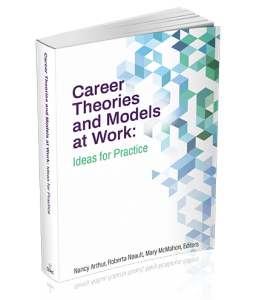This free webinar series offer the opportunity to further explore the career theories and models compiled in CERIC’s book Career Theories and Models at Work: Ideas for Practice. Webinars are led by the contributing authors to the book. More webinars (English and French) presented by the authors of the book will be added to the series soon!
Overview
Although it is now common and accepted that people will change jobs multiple times throughout their career, within society there remains this drive to be “one and done” by securing a life-long position. Given this drive, when individuals find themselves in a career transition, it can sometimes feel as if they are not doing what they are “supposed” to do, creating anxiety and self-doubt. The Theory of Work Adjustment can help address this disconnection by providing insight into how individuals reach and engage in career transitions. Importantly, the Theory of Work Adjustment goes beyond looking at the role of the individual situation in career transitions, and integrates the influence of the workplace. The result is a more comprehensive understanding of career transitions.
Why You Should Attend
In this free webinar, Jon will introduce the Theory of Work Adjustment with a focus on how practitioners can use this approach to help clients understand their career transitions.
Webinar Learnings:
- A general understanding of the Theory of Work Adjustment
- Insight into how individuals engage in career transitions
- The influence of the workplace (employers) on career transitions
- The intersection between individuals and the workplace (employers) in facilitating career transitions
- Beginning ideas in using the Theory of Work Adjustment with clients

Overview
Time is an important consideration in an individual’s career development. Our life path and everything that goes into it play a role in the development of personal projects which then, through their success, failure or interruption, reshape our developmental history. At every phase of our lives (past, present and future), we are continually applying adjustment strategies to the various facets of our lives. The extent to which these strategies help us adapt can vary. The tensions can be biographical (life path, personal projects) or interactional (context forces, adjustment strategies) in nature, but at the centre of them is an individual who is endeavouring to meet their needs.
Why You Should Attend
In this free webinar, Louis Cournoyer will present a career counselling concept based on the adaptive decision-making model. Participants will learn about the many significant aspects of how a career decision is made and will discover a method of initial and ongoing evaluation and intervention geared to clients’ needs.
Webinar Learnings:
- How individuals process information about themselves and make adjustments to their interpersonal and social systems that help them adapt, with varying degrees of success.
- Which basic needs, affective needs in particular, are central to a person’s motivations for change.
- How personal projects influence and shape a life path.
- Which context force adjustment strategies are in play between self-regulation and self‑protection mechanisms.

Overview
Psychological health at work is of crucial importance to us as career counselling and development practitioners. We endeavour, through various means, to foster the well-being of individuals in their relationship with work, to prevent malaise, burnout and obsolescence. But what about our own psychological health at work? How do we maintain it, keep it from deteriorating? As helping professionals, we are often urged to first care for ourselves so we can better care for others. In this free webinar, we propose expanding the concept of “self-care” by showing the importance of taking care of our work, of defending our occupation, from a perspective of well-being at work.
Why You Should Attend
Participants will be introduced to several theoretical and practical principles of a critical clinical approach for work and psychological health.
Webinar Learnings:
- Understanding the dynamic connections between work and psychological health
- Developing a vision of psychological health beyond the individualization and medicalization of existence
- Understanding why and how to use “occupation protection strategies” and professional advocacy to prevent psychological health problems at work
- Identifying potential ways to apply the principles of this approach
Simon Viviers, C.C., is a Professor of Counselling Sciences, Department of Educational Foundations and Practices, Université Laval, and a regular researcher at the Research and Intervention Centre on Education and Working Life (CRIEVAT). His research focuses on the relationship with work and the psychological health of education and helping personnel. Simon Viviers is also a co-author of the book Career Theories and Models at Work: Ideas for Practice (Chapter 40: Taking Care of Oneself by Taking Care of One’s Work : A Clinical and Critical Perspective on Work and Mental Health).
Overview
Psychology of Working Theory (PWT) provides an inclusive and critical view of work and career that is uniquely suited for our uncertain era. The PWT advocates for a more seamless approach to understanding work, arguing that contemporary approaches to counselling and research need to embrace the intersection of work, social identities, ability/disability status and mental health.
Why You Should Attend
In this free webinar, David L. Blustein will share an overview of the Psychology of Working Theory and present the cutting-edge implications for practice and systems change. The implications of the changing workforce, as detailed in his recently published book The Importance of Work in an Age of Uncertainty: The Eroding Work Experience in America will also be reviewed as an illustration of psychology of working theory in relation to real-world problems. This free webinar is of value to anyone interested in work and career, including but not limited to career and mental health counsellors; career development specialists; career coaches; educators; vocational and counselling psychologists.
Webinar Learnings:
- Major assumptions and tenets of psychology of working theory
- Theoretical framework underlying the psychological study of working
- Relationship between work and non-work roles
- The fundamental human needs that working has the potential to fulfill
- Applications of psychology of working theory to counselling practice
- Applications of psychology of working theory to systemic change
- Major conclusions from The Importance of Work in an Age of Uncertainty


CERIC’s book Career Theories and Models at Work: Ideas for Practice is an international collection of contemporary and emerging career development theories and models that aims to inform the practice of career development professionals around the globe. It is also intended to be used as a text for undergraduate and graduate career counselling courses.
- Contains 43 chapters on the theories and models that define the practice of career development today
- Contributors are 60 of the leading career researchers and practitioners from four continents and nine countries: Australia, Canada, England, Finland, India, the Netherlands, New Zealand, South Africa and the United States
- Featured authors include the original theorists and those who have adapted the work in unique ways to inform career development practice
-

